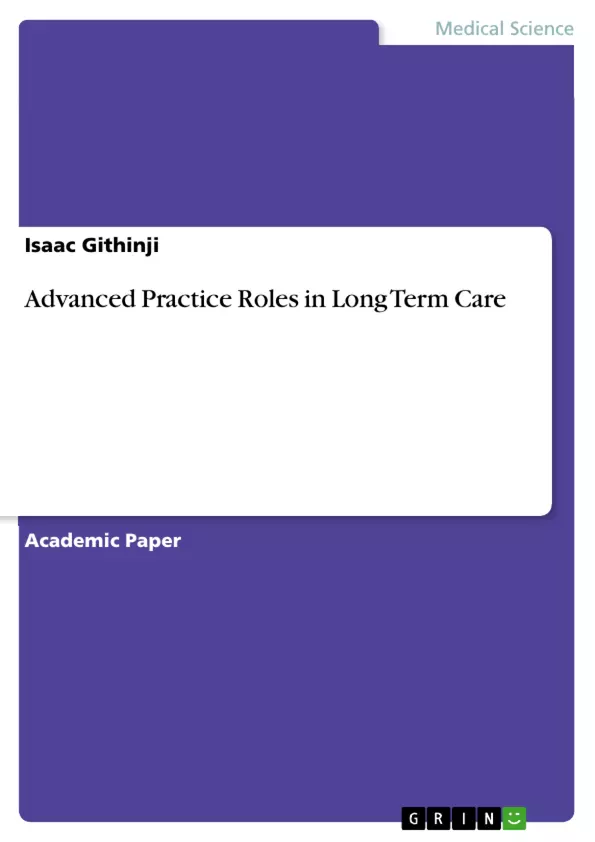The purpose of this paper is to review all APN (Advanced Practice Nurse) roles and then look at my specialty, including the core competencies, certification requirements, scope of practice, and legal aspects for this particular position. The paper will also discuss the practice environment, population, and colleague health care professionals I will be working with, as well as the future leadership role and contribution to professional organizations.
The evolving needs of patients and the growing complexity of health care delivery models have generated a demand for several specialized health care professionals, comprising APNs. APNs have an essential role, holding a wide range of executive and managerial positions that significantly influence the health care industry. These specialized health care professionals have expanded the alternatives for health service delivery, as well as facilitating the development of more pathways to healthcare careers and leadership opportunities for nurses.
It should be noted that APNs are made up of nurse practitioners, nurse administrators, nurse educators, or nurse informaticists. Each APN performs a distinctive role; however, their responsibilities may intersect in some areas. Guided by fundamental skills and an understanding of the connection between education, experience, and patient outcomes, each APN plays a crucial part in the healthcare context.
Inhaltsverzeichnis (Table of Contents)
- Advanced Practice Roles in Nursing
- Selected Advanced Practice Role - Family Nurse Practitioner
Zielsetzung und Themenschwerpunkte (Objectives and Key Themes)
This paper aims to review all Advanced Practice Nurse (APN) roles and then focus on the Family Nurse Practitioner (FNP) role. It will delve into the core competencies, certification requirements, scope of practice, and legal aspects of the FNP role, as well as discuss the practice environment, population, and colleague healthcare professionals involved. The paper will also explore the potential for future leadership and contribution to professional organizations.
- Advanced Practice Roles in Nursing
- The Role of the Family Nurse Practitioner (FNP)
- Core Competencies and Skills for FNPs
- Practice Environment and Population Served
- Future Leadership and Professional Contributions
Zusammenfassung der Kapitel (Chapter Summaries)
- Advanced Practice Roles in Nursing: This section defines and differentiates between Advanced Nursing Practice (ANP) and Advanced Practice Nursing (APN), highlighting the core values that underpin these roles. It then provides a comprehensive overview of the various APN specialties including the Nurse Practitioner (NP), Clinical Nurse Specialist (CNS), Certified Registered Nurse Anesthetist (CRNA), and Certified Nurse-Midwife (CNM), detailing their roles, responsibilities, and areas of expertise.
- Selected Advanced Practice Role - Family Nurse Practitioner: This section focuses on the FNP role, examining its core competencies, practice settings, and the unique challenges and opportunities associated with this specialization. An interview with a practicing FNP provides insights into the day-to-day realities of this role, including the clinical skills, communication abilities, and collaborative partnerships required for success.
Schlüsselwörter (Keywords)
This paper focuses on advanced practice nursing, particularly the Family Nurse Practitioner (FNP) role. Key concepts include core competencies, certification requirements, scope of practice, legal aspects, practice environment, population served, future leadership, and professional contributions.
Frequently Asked Questions
What is an Advanced Practice Nurse (APN)?
An APN is a nurse with advanced clinical education and training, such as Nurse Practitioners, Nurse Anesthetists, or Clinical Nurse Specialists.
What does a Family Nurse Practitioner (FNP) do?
An FNP provides comprehensive healthcare to individuals and families across the lifespan, including diagnosis, treatment, and management of acute and chronic illnesses.
What are the certification requirements for an FNP?
FNPs typically require a Master's or Doctoral degree in nursing and must pass a national certification exam to practice.
In which environments do APNs work?
APNs work in various settings, including long-term care facilities, hospitals, private practices, and community clinics.
How do APNs influence the healthcare industry?
They expand access to care, improve patient outcomes through specialized knowledge, and hold leadership roles in healthcare management.
- Quote paper
- Isaac Githinji (Author), 2019, Advanced Practice Roles in Long Term Care, Munich, GRIN Verlag, https://www.grin.com/document/1167289



